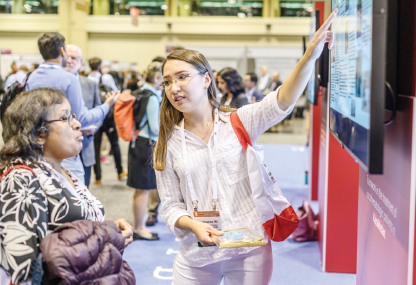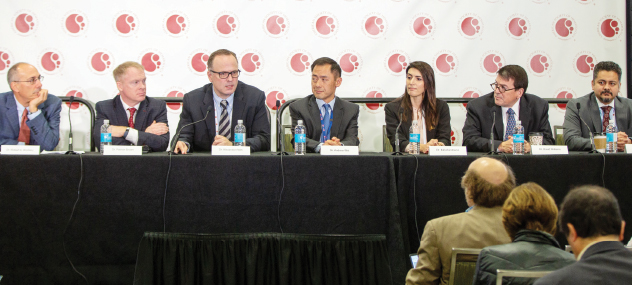More than 25,000 specialists in hematology from over 115 countries attended the 61st American Society of Hematology (ASH) Annual Meeting & Exposition held last December in Orlando. The conference featured a stunning array of 4,900 abstracts with impressive new data in the treatment of multiple myeloma, leukemia, lymphoma, and myeloproliferative neoplasms that may provide a paradigm shift in how these cancers are treated in the future.
Among the most exciting data presented at the conference included studies in bispecific antibodies in the treatment of leukemia and lymphoma, including blinatumomab, a CD19-directed CD3 T-cell engager immunotherapy, and the first bispecific approved by the U.S. Food and Drug Administration (FDA) for the treatment of patients with relapsed or refractory B-cell acute lymphocytic leukemia (ALL).1

Approximately 4,900 abstracts were presented during oral sessions and poster sessions during the ASH 2019 Annual Meeting & Exposition. Photo by © ASH/Todd Buchanan 2019.
In a late-breaking abstract from the Children’s Oncology Group Study AALL1331, among young patients who relapsed after chemotherapy for B-cell ALL, blinatumomab improved event-free survival and overall survival, compared with standard chemotherapy as post-reinduction consolidation therapy at first relapse prior to hematopoietic stem cell transplant.2 The therapy also led to fewer and less severe toxicities, higher rates of minimal residual disease response, and to more patients subsequently undergoing transplantation.
“We are excited that these patients, whose survival has not substantially improved for decades, now have a new and better standard of care,” commented Patrick A. Brown, MD, Director of the Pediatric Leukemia Program at the Sidney Kimmel Comprehensive Cancer Center, Johns Hopkins University, and lead author of the study, at the conference.
Also making headlines during ASH were results from several studies in the treatment of chronic lymphocytic leukemia (CLL), including the ELEVATE-TN phase III study evaluating the safety and efficacy of the second-generation Bruton’s tyrosine kinase (BTK) inhibitor acalabrutinib in patients with treatment-naive CLL. Results from the study show that acalabrutinib, alone or in combination with obinutuzumab significantly improved progression-free survival compared with the standard combination of obinutuzumab/chlorambucil in these patients.3
Lymphoma
Second-generation bispecific antibody agents in the treatment of non-Hodgkin lymphoma made big headlines at ASH, including the results from a phase I study of mosunetuzumab, a fully humanized immunoglobulin G1 bispecific antibody targeting both CD3 and CD20, presented during the Plenary Session. The study included 270 patients with lymphoma with a poor prognosis, some of whom had received prior chimeric antigen receptor (CAR) T-cell therapy.
Among 193 efficacy-evaluable patients, 124 had aggressive lymphoma and 67 had indolent lymphoma. The objective response rate was 37% among the patients with aggressive lymphomas, with 19% experiencing complete remission. Among the patients with indolent lymphomas, the objective response rate was 63%, with 43% experiencing complete remission. Of the 30 patients who had previously received CAR T-cell therapy, 18 were evaluable, of whom 39% had a response to mosunetuzumab, and 23% achieved a complete response.4
“Some of the patients in the complete-response group are now off mosunetuzumab,” commented Stephen J. Schuster, MD, Robert and Margarita Louis-Dreyfus Professor in Chronic Lymphocytic Leukemia and Lymphoma Clinical Care and Research, Perelman School of Medicine at the University of Pennsylvania and a principal investigator of this study, during the presentation. “This could mean that not only does mosunetuzumab have the ability to kill cancer, but also that it may help reengage CAR T cells and boost the effect of the prior CAR T-cell treatment.”
Another phase I study of a human anti-CD20 and anti-CD2 bispecific IgG4 antibody making headlines at ASH is REGN1979, which showed high clinical activity and tolerability in heavily pretreated patients with relapsed/refractory B-cell non-Hodgkin lymphoma, including those with previous anti-CD19 CAR T-cell therapy.5
Basem M. William, MD, MRCP (UK), FACP, Director of the T-Cell Lymphoma Program and and Member of the Blood and Marrow Transplant Program at The Ohio State University Comprehensive Cancer Center, Columbus, called many of these new-generation bispecific antibodies “highly promising” in the treatment of lymphoma.
Multiple Myeloma
Results from the phase III CANDOR trial evaluating a new triplet therapy of carfilzomib, dexamethasone, and daratumumab (KdD) for patients with relapsed/refractory multiple myeloma may offer a new treatment option for this hematologic malignancy. Currently, daratumumab is approved as monotherapy for patients with relapsed/refractory multiple myeloma, in combination with dexamethasone, or with dexamethasone and lenalidomide.
Data presented at ASH from the CANDOR clinical study showed that the triplet combination of carfilzomib, dexamethasone, and daratumumab yielded “markedly improved” progression-free survival compared with the doublet of carfilzomib and dexamethasone. At a median follow-up of 17 months, CANDOR met its primary endpoint of progression-free survival, resulting in a 37% reduction in the risk of disease progression or death in patients receiving KdD (hazard ratio = 0.63; 95% confidence interval = 0.464–0.854; P = .0014). Median progression-free survival was not reached for the KdD arm vs 15.8 months for the doublet arm of carfilzomib and dexamethasone.6
In commenting on the study results, principal investigator Saad Z. Usmani, MD, Chief of Plasma Cell Disorders at Levine Cancer Institute, Atrium Health, in Charlotte, said, “Overall, carfilzomib/dexamethasone/daratumumab was associated with a favorable benefit-risk profile and represents an efficacious new regimen for relapsed or refractory multiple myeloma, including lenalidomide-exposed and lenalidomide-refractory patients.”

Researchers presented summaries of their findings to press during the ASH 2019 Annual Meeting & Exposition. Photo by © ASH/Todd Buchanan 2019.
Another study showing positive results in the treatment of multiple myeloma is the phase Ib/II CARTITUDE-1 trial evaluating the B-cell maturation antigen (BCMA)-directed CAR T-cell therapy JNJ-4528 for the treatment of patients with heavily pretreated relapsed/refractory multiple myeloma. In this next-generation BCMA-targeted CAR T-cell therapy, 100% of the patients responded to the therapy, with 69% experiencing complete responses. All evaluable patients for minimal residual disease (MRD) status were MRD-negative. In addition, patients experienced less cytokine-release syndrome and neurotoxicity compared with patients treated with first-generation CAR T-cell products.7
Chronic Lymphocytic Leukemia/Small Lymphocytic Lymphoma
In addition to the phase III ELEVATE-TN clinical trial in patients with treatment-naive chronic lymphocytic leukemia (CLL), data from several other studies in the treatment of CLL are also worth noting. Among them are findings from the phase III SEQUOIA clinical trial, which includes a nonrandomized arm C, comprising 109 treatment-naive patients with del(17p) chronic lymphocytic leukemia or small lymphocytic lymphoma (SLL).
In this arm of the study, the patients were treated with another next-generation BTK inhibitor, zanubrutinib. The data from the study show that at a median follow-up of 10 months, the objective response rate was 92.7%; there were two complete responses (1.9%); 86 partial responses (78.9%); and 13 partial responses with lymphocytosis (11.9%). Responses were consistent across all subgroups.8
Zanubrutinib monotherapy in patients with CLL/SLL also showed high response rates in updated findings from the phase I/II AU-003 clinical trial. There were 123 patients enrolled in the CLL/SLL cohort of the study and among the 22 patients treated in the front-line setting, the investigator-reported objective response rate was 100%, with 5 complete responses (22.7%) and 17 partial responses (77.3%). Among patients with relapsed or refractory disease, the investigator-reported objective response rate was 95%, with 15 complete responses (13.9%), 73 partial responses (72.3%), and 8 partial responses with lymphocytosis.
In addition, among patients with del(17p) status, the objective response rate was 100% in treatment-naive patients (all partial responses); in patients with relapsed or refractory disease, the objective response rate was 92.3%, with one complete response (7.7%).9
“Zanubrutinib is a next-generation BTK inhibitor with pharmacodynamic and pharmacokinetic advantages over ibrutinib,” said Constantine S. Tam, MBBS, MD, a hematologist at the Peter MacCallum Cancer Centre and Herman Fellow of Translational Cancer Research at the University of Melbourne, Australia, during his presentation on the results from both studies. “The drug is approved by the U.S. Food and Drug Administration for relapsed or refractory mantle cell lymphoma and is being studied as front-line therapy in patients with CLL/SLL and Waldenström’s macroglobulinemia. With further experience, zanubrutinib monotherapy was found to be well tolerated and active in patients with CLL/SLL, irrespective of del(17p) status, with very high response rates.”
On the following pages of this supplement to The ASCO Post, we provide summaries of these and other study highlights from ASH.
—The Editors
REFERENCES
1. National Cancer Institute. FDA grants full approval to blinatumomab for acute lymphoblastic leukemia. Available at www.cancer.gov/news-events/cancer-currents-blog/2017/blinatumomab-all-fda-full-approval.
2. Brown PA, Ji L, Xu X, et al. 2019 ASH Annual Meeting & Exposition. Abstract LBA-1. Presented December 10, 2019.
3. Sharman JP, Banerji V, Fogliatto LM, et al: 2019 ASH Annual Meeting & Exposition. Abstract 31. Presented December 7, 2019.
4. Shuster SJ, Bartlett NL, Assouline S, et al: 2019 ASH Annual Meeting & Exposition. Abstract 6. Presented December 8, 2019.
5. Bannerji R, Allan JN, Arnason JE, et al. 2019 ASH Annual Meeting & Exposition. Abstract 762. Presented December 9, 2019.
6. Usmani SZ, Quach H, Mateos M-V, et al. 2019 ASH Annual Meeting & Exposition. Abstract LBA-6. Presented December 10, 2019.
7. Madduri D, Usmani SZ, Jagannath S, et al. 2019 ASH Annual Meeting & Exposition. Abstract 577. Presented December 9, 2019.
8. Tam CS, Robak T, Ghia P, et al. 2019 ASH Annual Meeting & Exposition. Abstract 499. Presented December 8, 2019.
9. Cull G, Simpson D, Opat S, et al. 2019 ASH Annual Meeting & Exposition. Abstract 500. Presented December 8, 2019.

